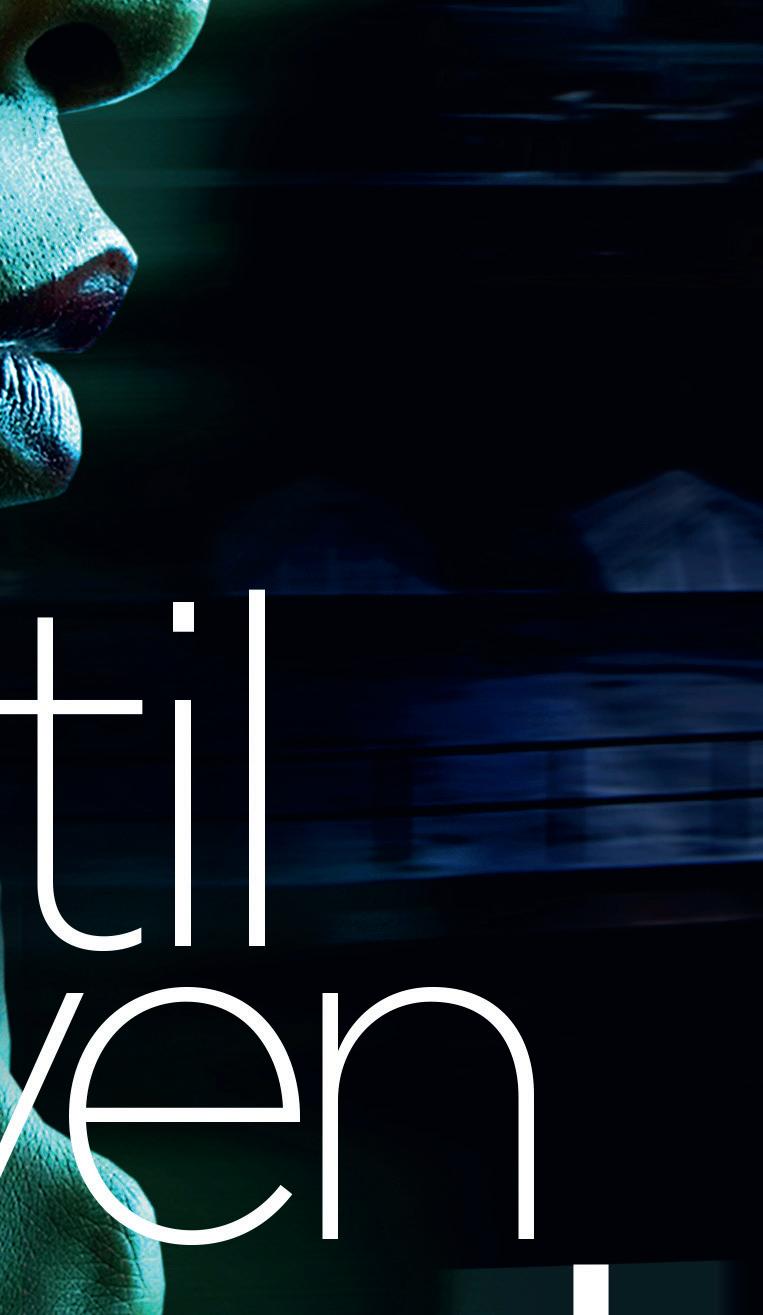UNTIL PROVEN INNOCENT
Nicola Williams
PENGUIN BOOK S
PENGUIN BOOKS
UK | USA | Canada | Ireland | Australia India | New Zealand | South Africa
Penguin Books is part of the Penguin Random House group of companies whose addresses can be found at global.penguinrandomhouse.com.
First published by Hamish Hamilton 2023
Published in Penguin Books 2024 001
Copyright © Nicola Williams, 2023
The moral right of the author has been asserted
Typeset by Jouve (UK ), Milton Keynes
Printed and bound in Great Britain by Clays Ltd, Elcograf S.p.A.
The authorized representative in the EEA is Penguin Random House Ireland, Morrison Chambers, 32 Nassau Street, Dublin D02 YH 68
A CIP catalogue record for this book is available from the British Library
ISBN : 978–0–241–99547–1
www.greenpenguin.co.uk
Penguin Random House is committed to a sustainable future for our business, our readers and our planet. is book is made from Forest Stewardship Council® certified paper
To the oldest and youngest members of my family: my mother, Waveney Williams (born 1931) and my great-niece Niylah-June Feliu-Watson (born 2022).
And to my friend Tony Laforce (1962–2022), who since we met nearly twenty years ago became one of my best friends ever. He loved books, and writing, and read more across a wider range of genres than any person I know, so it is fitting that wherever this book goes his name will be in it. At the time of writing this his loss is very recent, so this is hard. He is much loved and missed by all who knew him, and he was, quite simply, one of a kind.
Walking alone in Peckham on a dark, wet, wintry night, the last thing you want to hear is footsteps behind you. JT had been hearing them for somewhere between a minute and forever. During that time he had done everything he could to shake them o . He had walked as quickly as possible without running – too conspicuous – until he reached the yellow- orange glare of the street lights on the semideserted road near where he lived. He had alternately picked up then slacked o his pace, only to hear a corresponding variation in the footfall behind him. But there were two things he wasn’t going to do: stop and look behind him, or run. No point, if they were going to do for him. He’d never outrun a bullet.
For a Friday night, he couldn’t believe how empty the streets were. Just his luck. But as he approached the bus stop he saw a large woman in her late fties under the shelter, clearly just o the night shift. It seemed a miracle she was standing there at all. But she might just be the miracle he needed.
‘You got the time, love?’ he shouted as he approached, trying and failing to hide the nervous edge in his voice. Out of the corner of his eye he could see a bus slowing down. Maybe he could jump on that. Or others would get o . Either way, at least there would be witnesses.
Instinctively the woman clutched her bag to her body. She peered
at him, rst with guarded curiosity, then, as she recognized him, with open contempt.
‘Me? I know who you are, Jimmy Thomas. I wouldn’t piss on you if you were on re!’ She jerked her head forward, to a point in the distance somewhere behind his shoulder. ‘Ask him!’
The man was gaining. He knew it. The bus was still too far away. ‘Fucking bitch!’ he muttered, as he hurried past.
‘Think I haven’t been called worse?’ she shouted after him.
Behind him, he could hear the swish of the bus doors opening and closing. Then silence. He buried his hands deeper into his jacket and felt the comforting cold metal in his right-hand pocket. Even though she was a neighbour, he’d been surprised when she gave it to him. He didn’t think her type had anything to do with guns. But he didn’t ask any questions. No one did, round here. Besides, in his line of work he should have had one long ago. He wished Ray had been with him. He’d have known what to do. But he’d needed to make a quick decision – take it, or not. So he took it.
It was one thing walking around with a nine, though quite another to use it. He hadn’t even taken it out yet and his hand was already trembling. He had known the day would come, that rst time.
‘Don’t even think about it!’
JT had no idea how the man behind him had come so close, so quickly, but he recognized the voice even before he was spun round and pushed up against a high concrete wall.
‘You’d better keep your fucking hands where I can see them, if you know what’s good for you. What you got in there, then?’ his attacker continued, right hand rummaging through his pockets as his eshy left forearm pressed against his windpipe.
‘Fuck o !’ JT managed to splutter. ‘You can’t do that to me!’
‘What do you mean, I can’t do that to you?’ he replied, mimicking
the smaller man’s choking, spluttering voice. ‘It’s Sergeant Jack Lambert, and I am doing it to you, you fucking little grass. Not even a good one, at that.’ Still searching, he increased the pressure on JT’s neck. ‘Aha!’ He pulled the gun out of JT’s pocket. ‘Look what I’ve found. And I thought I’d just nd you running drugs for Tony.’ Lambert slowly raised the gun. JT squeezed his eyes shut as he felt it pressing high against his temple, tasting vomit rising in his constricted throat. If he was lucky, maybe he would pass out rst.
‘So what’s this about? I know you don’t have the balls to use one of these. You know what judges are giving for possessing a rearm, what with “London’s inner-city gun-crime problem” and all? Especially if you’ve been threatening a police o cer with it. And you not long out of Pentonville. You know,’ he added slowly, ‘I could kill you right here for all the use you’ve been to me lately. Think anyone round here would care?’
‘Jesus, don’t shoot, Sergeant.’ He could barely get the words out. He was crying now too, but he didn’t care. ‘I can’t breathe . . .’
‘You’re still talking, though.’ But suddenly Lambert loosened his grip and watched impassively as JT doubled over, gasping and clutching his throat. When he nally stood up, the red marks on his pale neck and the bruising on his forehead were as visible as the mixture of hatred and fear in his eyes. That was the look Lambert wanted to see.
‘So, what do you know about Tony? What do you have that’s fresh?’
JT looked sullenly at Lambert. It was always Tony. ‘Nothing you don’t already know. And don’t bother hitting me again neither. I’ve told you before: it’s di erent now. More fancy customers; less risk. Someone who wants some lines for their dinner party and who’s always gonna pay, no questions asked.’
‘But he hasn’t stopped round here, has he? He’s making it even more of a shithole than it already is.’ Lambert clenched his st, then tightened it further as if squeezing a lemon. ‘You better start giving me something I can use, otherwise you’re no good to me. Just how long do you think you’ll last when I put the word out that you were my grass? And next time, don’t try hiding – not from me. You know what I can do.’ Lambert waved the gun in JT’s face one last time before putting it in his pocket. ‘And I’ll take this. You can’t use it anyway. Didn’t even know the safety was still on.’
JT stared at him, genuinely frightened. ‘But it’s not mine.’
‘Oh, I know. All the times I’ve nicked you, you’ve never had one. Besides, how many people round here can a ord their own gun? You know how many robberies and shootings this has probably been used in? If you don’t have anything useful for me next time, I’ll nick you for this.’
Lambert watched as JT staggered away from the wall and up the street. The rain was spitting in his face, plastering what was left of his hair to his skull, but he waited until his informant rounded the corner. He’d have to work out what to do with the gun. He was a police o cer, after all. But he didn’t have time for that now. He had something else to attend to, and he was running late.
Anyone walking past the Church of God Ministry on that rainy February night would have been hard-pressed to notice the man lurking in the shadows by the side entrance, as big and burly as he was. And that was just the way Jack Lambert wanted it. The one thing the job taught you was to cover all the angles. If he had been spotted, as dishevelled as he knew he looked, no one would have mistaken him for a criminal; everyone knew that, round here, the criminals were the best-dressed people in the neighbourhood. They wouldn’t have been caught dead in a glori ed donkey jacket smelling of smoke and beer, and a pair of Doc Martens that had certainly seen better days. And even if designer stubble had still been a fashion statement, his wasn’t. At worst, he would most probably be mistaken for an odd-job man, perhaps, or maybe even a vagrant looking for a handout; after all, he thought cynically, everyone knew the virtuous minister’s wife never turned away anyone in need. Virtuous – what a fucking joke. But no one would have believed it was him, a police o cer, anyway. Though he lived locally, few London coppers lived in the same area they policed, and the only time he had ever set foot in a church was for the disaster he used to call his marriage – so long ago he couldn’t even remember where the church was, let alone what denomination. The only thing he hadn’t counted on was anyone else being around other than the person he had come to see. It was Friday, after all, not
Sunday – and it was late. He could hear music: some kind of singing and a piano, plus other voices, talking. Still, he knew he was expected. He wouldn’t have to wait long.
He heard bolts being slowly pulled back, as if to mu e the sound, and a key turning, tentatively, in the lock. Then the door opened about three inches and a woman’s face peered up at him, around a foot below his own.
‘I can’t speak to you now. There’s too many people, and my husband’s still here.’
‘I don’t think you want me to go away.’ He bent down and put his face as close as he could to hers. ‘In fact, I think you’d better invite me in.’
He watched her recoil, but, as he expected, seconds later he was standing just inside the doorway. The music sounded louder now. She looked nervously over her shoulder. They were both at the end of a long, dark corridor. At the other end was a door with a small glass panel. The faint light from beyond the door and a dim nightlight provided the hallway with its only illumination.
‘This is a house of God. We don’t allow drunks in here!’
‘Come o it, lady. I bet your husband likes a nip of the communion wine. Anyway, you’re in no position to get all high and mighty with me.’ Lambert deliberately leaned forward again so that she could get the full alcoholic e ect. ‘You know that.’
He watched as the woman inched and turned away, a ected either by his breath or his words. Probably both.
‘What do I have to do to get you to leave my son alone?’
‘Keep him out of trouble, for one. But you can’t do that, can you? So you’ll have to give me some money instead. Like we discussed.’
‘And suppose I don’t?’
That was an angle he hadn’t covered; it had never crossed
Lambert’s mind that she would have thought of doing something so stupid, not for a moment. The woman herself seemed surprised at what she had just said. From the look on her face, Lambert knew that she had already changed her mind even before he spoke again.
‘Well.’ He started counting o reasons on big, thick ngers. ‘One, he’ll go to jail again – and I can tell you, the longer you’ve been out, the harder it is to do more time. Two, everyone will know about the Reverend’s thieving, drug-dealing son.’
‘Most people already know,’ she replied, embarrassment and regret heavy in her voice.
‘You didn’t hear me, Eloise. I said everyone would know. And they might get to hear about that other little matter – something I know you’d really want to keep secret. You have another son, don’t you? Paul? How do you think he’d feel about his saintly mum if he knew?’ Lambert looked her up and down, his gaze deliberately leering, sexual. ‘Yeah, you were probably a tasty piece back then. Not really my type, mind.’
The woman’s shoulders drooped. For long moments the only sound was that of the choir rehearsing as she struggled to regain her composure. The earlier ash of de ance had now completely disappeared. She was defeated, defeated in the one place where she would never have imagined this to happen to her.
‘The amount we talked about, I . . . I can’t get you that. I don’t have it.’
‘Ask your husband.’
‘You know he wouldn’t help. And what excuse would I give him?’
‘If there’s one thing I know about you people, it’s that you lot are very religious. Always giving money to your churches like some good luck charm. Black magic, if you like.’ He laughed at his own bad joke. ‘Doesn’t do you much good, though, does it? You’re still at
the bottom of the pile. Fucking Poles come in and even they’re better than you.’ He paused, relishing the hurt look on her face. ‘You must have a church fund of some sort. Take it out of that.’
Even in the half-light, Lambert could see the horror on her face. ‘I can’t do that!’
‘Not my problem, darling. Just get it. You know what’ll happen if you don’t.’
Suddenly, a light was switched on in the upstairs landing, not quite enough to light up the hallway but enough to make them more noticeable.
‘Eloise, who’s that downstairs?’ a voice called.
‘Ah, the good man himself,’ Lambert hissed.
‘No one, Desmond,’ Eloise replied as she attempted to push Lambert out through the door.
‘Thought you lot thought lying was a sin.’
He was openly mocking her now – her, and everything she held dear. Eloise stopped pushing and for the rst time that evening looked him full in the face. Without taking her eyes o him, she continued, ‘Just someone begging for money.’
‘How many times have I told you, don’t give them any money. Food, yes, but no money. Come upstairs, please. There’s something I’d like to show you.’
‘I’ll be back at the end of the week,’ Lambert said, under his breath. ‘You’d better have it ready for me then.’
He had already turned away when he heard the door shut behind him. He looked around before he emerged from the shadows and slipped through the half-open gate, making sure no one saw him. Things were going pretty much to plan, but Eloise Matthews might not be quite the pushover he’d expected.
Perhaps it was time for some rmer persuasion.
It was a paean to conspicuous consumption, but Lee had to admit it was money well spent. If Maple Court was going to throw a barristers’ party, it might as well be a good one. The venue was lovely. Not some cheese-and-wine embarrassment in the Chambers library, but a proper blowout. There was an expensive sheen of a uence that could only re ect well on Chambers. A live jazz band was positioned just in front of a waterfall cascading from ceiling to oor, the gentle splashing of the water blending smoothly with the sophisticated music. Uniformed waiters and waitresses glided expertly through the crowd like swans, gracefully carrying trays of wine and champagne, and platters of expensive canapés. The women in particular – girls, really – were remarkably attractive. Tom’s doing, no doubt.
Each member of Chambers had to pay £1,000 towards it. This was described as a ‘voluntary contribution’, when in fact it was anything but. She suspected the at rate had been Giles’s and Tom’s idea; as Head of Chambers and Senior Clerk respectively, that was nothing to them. Even she wouldn’t feel it that much – not at the moment, anyway. But the pupils and junior tenants – some of whom, after Clerks’ fees and Chambers’ expenses, wouldn’t make that in a month – had complained bitterly. Maybe that was why a gaggle of them were knocking back as much free champagne as they could – with unfortunate consequences. Under di erent
circumstances, Lee would have been right there with them, but she was experienced enough to know that even though this was a party, she wasn’t here to enjoy herself. This was a one-drink event, maximum. In spite of the Knightsbridge setting, live jazz trio and open bar, this was work.
She had spent a good two hours schmoozing – speaking to her regular solicitors, letting them know how important their continuing patronage was; cultivating new ones too because, as Tom was fond of saying, ‘You can never have too much work.’ Now her feet hurt. As tall as she was, she wondered why she bothered with heels at all. Leaning casually against the wall, she shifted her weight discreetly from one leg to the other and watched Giles and Tom separately working the room. From her vantage point, it was a silent study in power and in uence. Giles Townsend KC, orid and oozing smug pomposity, was holding forth on some topic or other to a group of younger lawyers, seemingly oblivious to the fact that the numbers were slowly dwindling. One after the other they drifted away, gravitating towards Tom, dressed in sleek Italian tailoring, like iron lings to a magnet. They were no fools: they knew where the real power in Chambers lay.
Just at that moment she saw Tom glance in her direction. He whispered something to Dean, the Junior Clerk standing next to him, then excused himself and sauntered over. The mere fact of him doing so caused the group he had left to look at her with renewed respect.
‘Ah, Ms Mitchell – the Michelle Obama of the Bar. Good bash, don’t you think?’ It was always Ms Mitchell with Tom – a formality he chose with every barrister in Chambers, rather than one that was forced upon him. ‘Of course,’ he continued, still scanning the room, ‘I’d like it better if the juniors weren’t drinking us dry. If they get
pissed and lose us work, I’ll have their balls.’ Looking at her nearempty glass, he beckoned to a passing waiter. ‘Would you like another drink? Better get it whilst there’s still some left.’
‘No thanks, Tom, I’m driving. Besides, I’ll be leaving soon.’
‘Oh!’ He sounded more displeased than disappointed. ‘Well, I saw you chatting to the head of Devereux Chambers. I know he’s been very impressed with you since the Omartian trial. Not thinking of leaving us, are you?’
‘You been spying on me, Tom?’
‘Let’s just say I take a very keen interest in all my – er, Chambers’ barristers,’ he corrected himself quickly, ‘especially one of our rising stars. I’d like to think this was just the continuation of an already thriving career in Maple Court, one that I’m sure will become increasingly successful.’ He paused. ‘In fact, I can guarantee it.’
‘Not even you can guarantee that, Tom. These things go in cycles. Two years ago I was just as good as I am now, and I was barely making ends meet.’
So far they had been standing side by side, looking for all the world as if they were having a genial social conversation between colleagues. Now Tom turned to face Lee.
‘I’m surprised at you, Ms Mitchell. I thought you were too smart to underestimate me.’
‘I was thinking the same thing. Now I’ve got a major win under my belt, and lots of new work coming in, we both know I’m an asset to Chambers. And if I go to Devereux or anywhere else, my practice will follow me.’
It was a while before Tom replied. ‘Well, as you yourself said, these things go in cycles. I’ll see you on Monday.’ As he moved away, he looked her up and down. ‘Nice shoes.’
Lee had had enough. She shed her mobile out of her evening bag
and was just about to ring David when she heard, ‘Well, at least he gave you a compliment!’
Lee looked around to where a seemingly disembodied voice was coming from behind a large potted plant. She would have recognized it anywhere.
‘Mary? I thought you’d left. How did you manage to hide behind here without being spotted? Especially by Tom?’
‘With my big pregnant bulk, you mean?’ Mary Fisher said ruefully. Lee watched as she shifted her position in her seat slightly, resting her hands above and below her belly as she did so. ‘No, just taking a breather. I’m staying until the bitter end. Once the baby comes, I’ll be out of commission inde nitely. This is my last chance to make sure my solicitors don’t forget me.’
Suddenly Lee was dying for a cigarette, but smoking indoors was out of the question. In any event, she had stopped smoking completely around Mary since the day she had announced she was pregnant. It was no small sacri ce, but she knew her friend appreciated it.
‘Tom won’t let them forget you, you realize that.’
‘Why? Because of Ollie? Nice to know that being married to very minor aristocracy with no money will keep me a place in Chambers, but Tom wouldn’t care if I got any actual work. I could come back to a shit practice – or none at all.’ Mary’s tone was now prickly and defensive. ‘Would you want him to do that for you as the only Black woman barrister in Chambers?’
Lee stared at her. ‘What’s your problem? Any time you want to swap, Mary, just let me know.’
‘Shit! I’m really sorry, Lee. I don’t know what’s wrong with me lately. I’m becoming a raging hormonal bitch. I feel fat and tired. My feet are so swollen I dare not take my shoes o in case I can’t get them
back on again, and I haven’t had sex in what seems like centuries – a problem I’m sure you’re unfamiliar with. How is David, by the way?’
‘At home. You know he hates these things. I can be there in less than half an hour if I leave now.’ Lee drained her glass. ‘How are you getting home?’
‘Ollie’s coming to pick me up. He’s being very protective. Sweet, really. But I’ll de nitely be in Chambers at some point next week – unless the baby makes an early appearance.’ She paused, adding thoughtfully, ‘Having kids is good for a family law practice: people see the pictures on your desk and think you know what you’re talking about. What about you?’
‘I’m starting an armed robbery on Monday. Should go three to four weeks if it doesn’t plead or carve.’
‘If my hearing is listed for Monday and it nishes early, I’ll probably go straight home and ring the clerks from there. The Tube at rush hour is no place for a woman in my condition. Teenagers surgically attached to their mobiles; able-bodied men, legs akimbo – fuck the “baby on board” badge. I’ll only get a seat if a woman o ers it to me.’
Lee smiled. ‘You’re turning into a grumpy old woman, you know that? I’m going outside for a cigarette before I drive home.’
A member of sta opened the heavy glass door for Lee as she made her way out.
‘Would you like a taxi, madam?’
‘No, my car’s here.’ She retrieved her valet token from her bag and gave it to him.
‘Right away, madam.’
The valet brought her car to a graceful stop at the foot of the hotel steps, remaining in it a fraction longer than he needed to. As he got out, he gave Lee a slightly puzzled look, and then handed over the
keys with a polite, practised smile. As they walked to the driver’s side together, he whispered, ‘Excuse me, you a lawyer?’
Not someone else looking for free legal advice. For a minute, she thought about lying, before answering, ‘Yes. Why?’
‘I knew it!’ His smile was big, and genuine now. He glanced over at the doorman, who was staring at them both. ‘Not supposed to talk to the customers. You probably don’t remember me. Mark? Mark Herbert? You got me o a TWOC-ing when I thought I was going inside for sure. Ray Willis recommended you. He was always bigging you up. That was my chance. Got this job and haven’t been nicked since.’
Ray Willis. Lee didn’t want to go down that memory lane. ‘But you still like cars, I see.’
He laughed. ‘Yeah, but at least it’s legal now. It’s not much, but I’m not going to fuck this up.’ He opened the driver’s door for her. ‘Thanks again. Nice motor, by the way.’
Mark was right: even though Lee wasn’t in love with it yet, she had to admit it was a nice motor. It had been hard to part with her old Saab convertible. Even with one previous owner it had been at the top of her price range when she bought it at the start of her career, but it symbolized where she wanted to go – in every sense. This new Audi spoke of quiet wealth and elegance; the car you get when you’ve made it. Plus she wanted a hybrid and this was the best on the market. From second-hand to brand-new luxury re ected her career at the Bar thus far.
As the driver’s door was slammed shut, its heavy sound was reassuring. With the windows wound up and the music on, she felt as if she were in a steel-and-glass cocoon. She turned slowly into the usual late-night Friday tra c and headed south of the river.
London was becoming increasingly tribal. It was a short journey
home, but the ethnic make-up and types of housing during the journey were like experiencing a world in one city – moving through areas dominated by di erent groups, from a uence to social housing and back again. Historically, the area straddling Brixton and Tulse Hill where she had grown up had been one of the poorest. Not any more. Nothing like an artisanal co ee shop and an expensive deli here and there to mark out gentri cation. But there were still pockets of decay and neglect that remained. In some ways it was worse now. No matter how bad things got back then, gun crime, knife crime and stealing from your neighbours had been virtually unheard of.
The ashing blue lights up ahead, therefore, were, sadly, no surprise. However, the sheer number of police vehicles was. In this area, that could only mean one thing. A shooting. Cars that had been owing freely up to this point slowed to a trickle as gawping occupants tried to see what they could. The closer Lee got to the crime scene, the denser the tra c became, until it was virtually at a standstill in both directions. Young police o cers were gesticulating in vain, desperately trying to keep things moving. Some looked nervous, others tense. She could see half a block had been cordoned o to the left, the blue-and-white tape extending out, narrowing the road.
She inched forward until her car was level with the greatest concentration of police vehicles. It had started to rain, the drops on the side windows obscuring her view, but she could see two police vans parked nose to tail with each other, forming a barrier between the eyes of the public and the frenzied activity behind them. Two o cers, presumably the drivers, were standing nearby. One looked slightly older, and, compared to his colleague, didn’t seem particularly bothered by the commotion going on around them. He was behaving for all the world as if he had seen it before, and probably had.
She pressed a button, and the electric window on the front passenger side slid down.
‘Excuse me, what’s going on?’
‘None of your fucking business!’ the younger one snapped. ‘Move on!’
Clearly all the training at Hendon didn’t extend to civility. ‘Well, o cer, seeing as I live just up the road, I consider this is my business. And move where? I’ve driven about a foot in the last ten minutes. And nice to see community policing at work. Is that how they’re teaching you to speak to people these days?’
‘No. That comes from being on the street and dealing with people like you.’
Lee’s calm evaporated like mist. ‘What the hell do you mean, people like me?’
The older o cer stepped forward. ‘Come on now, Doug. Knock it o . There’s no need for that.’ He spoke mildly, but as soon as he did so his colleague stepped back.
‘Suit yourself, Bill. You deal with it.’
Bill leaned into the window. It was raining more heavily now, spattering and bouncing o his yellow re ective jacket. ‘Sorry about that, ma’am. He’s a bit jumpy. We’ve had a very serious incident involving a youngster.’ He shook his head. ‘Not nice.’
‘Is it a shooting?’
He nodded but didn’t speak.
‘Is he dead?’ Lee tried to peer round his bulk, to see what she could observe in the sliver of space that separated the two vans. A siren wailed in the distance.
‘I’m not at liberty to tell you that, ma’am. And you’re not going to see anything like that, believe me.’ He stood up and looked ahead. ‘Tra c’s moving now. Drive on, please.’
But Lee had seen something. A glimpse of a brilliant white boxfresh trainer on the right foot of a prone body partway down an alley, the beam of the street light picking it out and illuminating it, making it stand out between the legs criss-crossing in front of it. Just that, but it was enough. A sight thirty minutes – and a world away – from the glittering party she had just left.
As she opened the door to the at, Lee could hear the faint sounds of a guitar strumming. David was still up. She didn’t know which was more of a relief – that, or the fact that she could, at last, go barefoot. She took o her shoes in the hallway, feeling the cold polished wooden oor beneath her feet, and walked towards the living room. The door was ajar. Her boyfriend was concentrating so hard on the task at hand that it was at least a minute until he looked up to greet her. When he did, though, the smile he gave her was worth it. Oddly enough, he looked relieved.
‘You’re late. I was wondering what had happened to you. Thought your Chambers thing was nishing at midnight.’
Lee looked at her watch: 1 a.m. ‘Why? Want to keep me safe from all the gangsters and carjackers out there?’ She thought about what she’d seen earlier.
David stopped playing, put the guitar down and looked directly at her. ‘I’m more worried about those sharks you work with. But there’s nothing wrong with a man wanting to protect his woman, Lee.’ He paused. ‘So, what happened? You don’t look like you had a good time.’
She leaned over and kissed the top of his shaven Black head. ‘I wish you’d been with me.’
‘You know I hate those things. The last time I went –’
‘The only time you went . . .’
‘– they asked me about music law. Music law! What the fuck do I know about that? That’s what music lawyers are for.’
She shook her head. ‘That’s not what I meant, anyway. Something happened near my mum’s house. A shooting.’ She thought of the single white trainer, again. ‘Someone young, I think. A teenager, maybe – right at the place that used to be a Caribbean grocer’s when I was growing up. My mum used to send me round there once, twice a week for stu you couldn’t get anywhere else. It’s derelict now, of course. Probably get redeveloped into some fancy ats.’ She laughed, but there was no humour in it. ‘Just like this one.’
‘No chance. This is The Hill, not Ricketts Road. Di erent league, baby.’
He wasn’t making things better. She sighed, got up and walked to the French windows leading on to the garden. The moon was struggling to ght its way out from behind a cloud, but at least it was succeeding. It was fast approaching 1.30 a.m., and still raining, but she needed the scent of fresh air and owers to clear her head. Living, growing things.
She didn’t hear David until he was standing right behind her. For a big man, he was amazingly light on his feet. Tall as she was, he made her feel protected and safe, both of which she needed right now. He put his arms around her waist and she leaned back against his broad chest. She traced the tail end of the tattoo snaking up his bicep, disappearing under the sleeve of his T-shirt.
‘Speaking of your mum, she called earlier.’ When Lee sti ened, David added, reassuringly, ‘Don’t worry, she’s ne. She said it was important, but it could wait. And that was the longest conversation I’ve had with her in a while.’ He was quiet for a moment, then said, ‘So, what do you want to do? Sell up and move? You’ve earned this, Lee. Don’t be ashamed of what you have.’
‘We have,’ she corrected.
‘Come on. I could never have a orded this on my own. You could, though. But the point is, we’re both from the endz. Moving back there won’t stop gun crime. You know that.’
‘So what will?’
‘Honestly? I have no idea. But at least I’m not pretending to know, like half the politicians and so-called community leaders out there.’ He squeezed her tight. ‘It’s late. Come on, let’s go to bed.’
Earlier that night, Wallace had been o - duty, but the station had called him anyway. He wasn’t angry – far from it. He would have given them a bollocking if they hadn’t. It was a new posting for him, and he had to make his mark. It would be a long drive in, but, like most o cers, he had long since given up the idea of living anywhere near where he worked. It was great in theory – until people realized who you were. Then, between little old ladies knocking on your door to report their cat missing and people slashing your tyres so often the insurers refused to pay up, your life became a misery.
In fact, he realized as he hit the M23 into London, he’d moved further and further out with each promotion; if he moved again, he’d end up living in the sea, not just near it. But it wasn’t as if he had much family in London – or anywhere, come to that. And friends seemed to be getting fewer and fewer each year. He thought about those he still had sometimes – mostly ghting in hot, arid countries, where there was certainly sun and sand, but de nitely no beach: as far removed from a holiday destination as you could get. He was still in touch with some of his ex-squaddie mates; occasionally they’d even get together to raise a glass to the Fallen. But that was it.
Without taking his eyes from the road, he selected a track on the car’s audio system. He was becoming expert at doing this at 70 mph. As the sound of Miles Davis lled the car, it occurred to him that he
was becoming the living embodiment of the jazz-bu loner who seemed to be the archetypal British TV detective. Except in real life they didn’t usually come in Black.
Miles was good to drive to, though: a uid, controlled fury which was just enough to keep him alert for what was to come.
For a Friday night, he made it up from the coast and into South London in good time. In fact, it was the last quarter of a mile to the crime scene that was the slowest. Up ahead, he could see his ocers directing the tra c, trying to move it forward, even encouraging cars to mount the pavement in a desperate attempt to clear the bottleneck. Wallace tooted his horn sharply, twice. No luck – the cars in front of him didn’t move an inch. He pressed down again on his horn, hard. The man in front of him, in a battered Nissan Micra, merely blew his own horn in response, turned round, looked at him and slowly, deliberately gave him the nger.
Wallace banged on his windscreen and wound the window down, holding up his warrant card. But the man in front just stuck his head out of his window, turned to face him and replied, in a heavy Eastern European accent, ‘You think that scare me? Police here not like back home.’
Wallace sighed. He knew there was nowhere for the tra c to go, but he had to get through. If he’d had blues and twos, that would have done the trick: nothing like a police siren and ashing lights to make even the heaviest tra c part like the Red Sea. But he had come up in his own car. He looked around. He could have sprinted the last four hundred yards if there had been anywhere to park.
But then, mercifully, the tra c moved forward again – just a little, but enough for him to get within shouting distance of one of the ocers standing next to two police vans.
‘Oi! Bill! Over here.’
Bill looked round, frowning at the thought of a member of the public presuming to call him by his rst name. Then he spotted Wallace. Even at that distance, Wallace could see the relief on his face. As he watched him approach, half jogging, but mostly walking, Wallace thought it was a good thing Bill Roberts was a police driver: with his bulk, he’d never catch anyone on foot. Good driver, though, and a solid, decent bloke. In the week since Wallace had been at the station, he’d already seen him demonstrate that. He would trust him with his own car, and that was saying something. Un appable too, like most of the old hands; not cynical, though, which was a miracle. Was it because he was that rarest of creatures – a policeman with a happy personal life?
‘Very glad to see you, guv,’ Roberts said, mopping his brow – whether from the exertion or the rst spatters of rain now beginning to fall, Wallace wasn’t sure. He nodded in acknowledgement.
‘All I’ve been told so far is that it’s a shooting. That was,’ Wallace looked at his watch, ‘nearly an hour and a half ago. Fill me in on the rest. Is he dead?’
‘Probably is by now, guv. Ambulance came earlier.’ Wallace found some o cers had a problem acknowledging his more senior rank, especially if they were older than him. He could tell by the way they addressed him – politely, but as if they had to force the words out, as if it somehow demeaned or diminished them to do so. Not so Bill Roberts. ‘It’s a miracle he didn’t die outright.’ The tra c had stopped again. ‘Best if you go on up ahead. You’ll be quicker on foot. Don’t worry, I’ll sort your car out.’
It was starting to rain more heavily now. Wallace ran towards the crime scene, zigzagging between cars and onlookers as he did so. He was tempted to put his hood up but thought better of it. After all, he didn’t want to get nicked on his way to his rst major crime at Miller
Street. Not all the o cers knew who he was, yet. Like this one, who he had seen standing with Bill earlier, and who was now trying to block his way.
‘And where do you think you’re going?’
‘I’m on the job,’ Wallace replied. But as he reached inside his hoodie for his warrant card, the o cer instinctively stepped back and grabbed the handle of his baton.
‘Hey, take it easy. Look.’ He held the card up. ‘You must have seen me talking to Bill down the road.’
‘Yeah. So?’ The o cer was clearly unconvinced. He examined the warrant card Wallace gave him as if it were a forgery. That really pissed him o .
‘Look, I didn’t drive sixty miles just to deal with this bullshit. If you don’t know who I am, that’s not my problem. I’m going in.’
He ducked under the blue-and-white tape. The other o cer didn’t try to stop him – having now realized who he was.
‘Really sorry, sir,’ he stammered. ‘I . . .’ He held the card out to him. Wallace snatched it back and headed grimly onwards. Behind him, he could hear the o cer muttering, defensively, ‘Well, I didn’t know . . .’ Wallace thought of Miles Davis in the car. Controlled fury. Maybe that’s why he liked his music so much. He knew.
But the task ahead was more important. Wallace could see four o cers in a group near a blood-soaked area on the ground. One of them, a sergeant, met him halfway. ‘Hello, boss.’ He sounded surprised. The others turned to stare at him, then turned back to the task at hand. ‘We knew you’d been informed, but we didn’t expect you to turn out. And on a night like this. You were o -duty, weren’t you?’
‘I was, Sergeant. Not any more.’ They all looked at him again, this time with renewed respect. ‘What do we have?’
‘Young Black lad. Fourteen, fteen maybe. Dog walker called it
in. One shot to the side of the head, close range. Went through the hood of his jacket. Good chunk of his face gone. That’s unusual. Could be personal, to get up that close. Or gang related, maybe? Ten to one it’s a street weapon. Beretta or Glock 9mm; the guns of choice these days.’ He paused. ‘Also, I reckon someone familiar with guns, but not used to using them.’
‘Why?’
‘Because they made a real mess and still didn’t manage to kill him outright.’
As they walked over to the others, the sergeant continued, ‘You live on the coast, don’t you, sir? Brighton?’
‘That’s right.’ Wallace pointed to a blood-spattered object about two feet away. ‘What’s that?’
‘His mobile, we think. Must have smashed when he fell. De nitely not a robbery, then. I couldn’t a ord one like that.’ Then he laughed. ‘Jesus, you needn’t have bothered coming out for this. If these kids think they are hard enough to be in a gang, they can all kill each other, that’s what I say.’ He handed him a bus pass. ‘We found this in his pocket. At least we know what he looked like when he still had a whole face.’
Wallace breathed in sharply and turned away. He’d only seen photos of him in chorister’s robes, but he knew who it was. It was all he could do to stop himself retching. Instinctively, he started to raise his hand to his mouth. Only the knowledge that the others were now staring at him made him stop.
‘Yeah, it is pretty nasty, sir,’ the sergeant said. He tried his best to sound sympathetic, but really, just what kind of people were they promoting nowadays? He was a bloody DCI, for God’s sake. Plus, rumour round the station was that he was ex- Army: served in Afghanistan – somewhere like that. He had to have seen worse. ‘It’s
harder when they’re young. Still, nothing you haven’t seen before, I’m sure.’
‘I know him . . . I know his family.’
‘You know him?’ the o cer repeated. He might interact with the locals, but he didn’t actually know anyone round these parts, and didn’t want to. He looked at the boy’s bus pass, then back to Wallace. ‘Bit young for a CHIS, isn’t he?’
‘He’s not an informant.’ Wallace was surprised at how calmly that came out, considering. He paused and tried to collect his thoughts, knowing all eyes were on him, clearly aware something was up. ‘Better alert our media people to be on standby. And call the Super. I’ll meet you back at the station. I’ve got something to do rst.’
Wallace thought of the hours ahead. This was going to be a long night.
For the rst time in nearly two hours, he stood up, straightened up fully, and tried to stretch out the tension which had accumulated in various parts of his body. He looked up at the same struggling moon and wondered why on earth it would want to come out and shine down on such a scene.








